Text
I wanna attempt to bullet journal, anyone have posts or tips to help figure out how to organize what you want?? and tracking ideas?
0 notes
Text
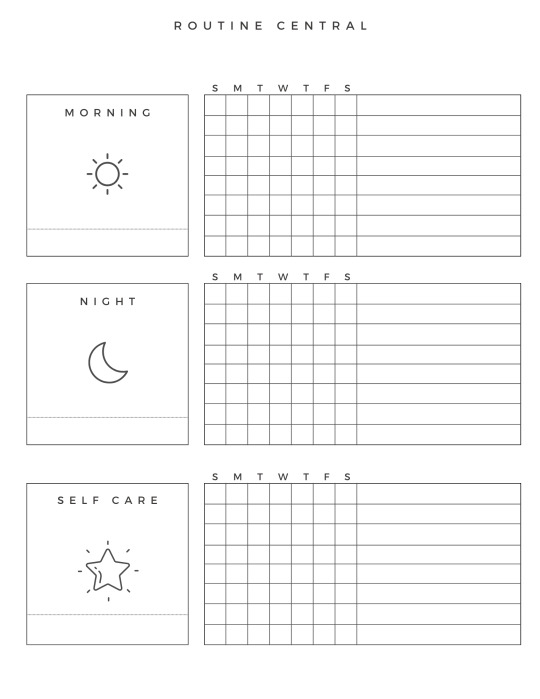
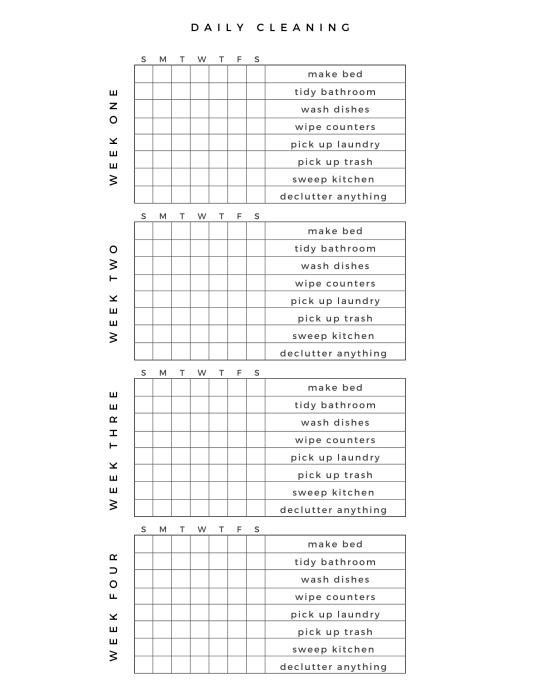
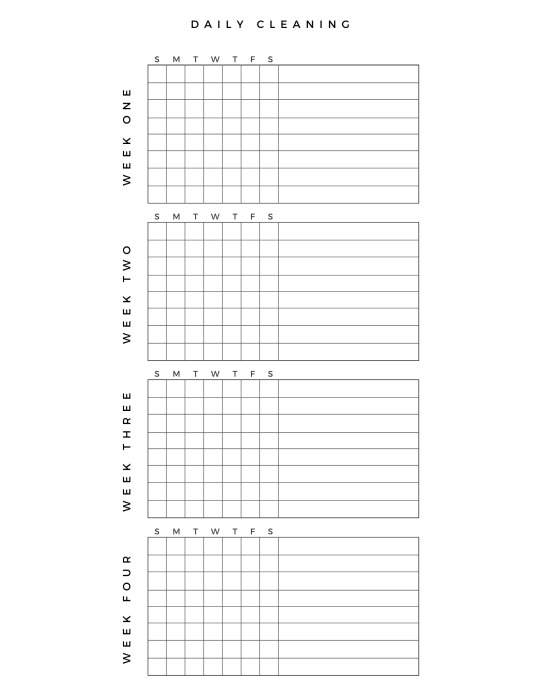
Hello! I made these this morning and thought I'd share. You can print these or use them as inspiration for your bullet journal-- whatever works for you. I made one daily cleaning checklist with suggestions and one without. Enjoy :0
I originally made these for myself (since it's easier to remember if I have something I have to physically "check" off) but realized it wouldn't hurt to share.
679 notes
·
View notes
Note
do you have any tips on learning ASL?
You need to find someone to practice with. you'll never be able to sign well if you don't practice having real conversations with real people.
Practice receptive skills, a lot of people learning ASL as a second language have awful receptive skills (particularly with fingerspelling) if you only have expressive skills you won't be able to communicate
Pay attention to the 5 parameters of ASL (hand shape, palm orientation, movement, location, non manual markers) when learning a new sign. if you explicitly look for these things then you're more likely to copy the sign correctly. messing up any of the parameters can completely change the meaning of the sign
Don't rely on fingerspelling English words that you don't know. try to find ways to phrase your sentence using the signs you know.
Never trust signs you see from hearing people to be accurate
Many ASL signs are iconic meaning they resemble their meaning in some way. Try to find the iconicity in the signs you use it will help you remember them
Focus on precision of signs not speed. Speed will come with time but accuracy is a must if you want to be understood
(Other people are welcome to add on)
201 notes
·
View notes
Text
Body Parts in French
Please note there are NSFW terms in this vocab list.
english | french
body | corps (m.)
head | tête (f.)
face | visage (m.)
hair | cheveux (m.pl.)
eyebrow | sourcil (m.) (often plural: sourcils)
forehead | front (m.)
eyes | yeux (m.pl.) (singular: œil (m.))
eyelash | cil (m.) (often plural: cils)
nose | nez (m.)
nostril | narine (f.)
mouth | bouche (f.)
lip | lèvre (f.)
tooth | dent (f.) (often plural: dents)
gum | gencive (f.) (often plural: gencives)
tongue | langue (f.)
jaw | mâchoire (f.)
chin | menton (m.)
ear | oreille (f.)
cheek | joue (f.) (often plural: joues)
neck | cou (m.)
throat | gorge (f.)
Adam's apple | pomme d'Adam (f.)
shoulder | épaule (f.)
arm | bras (m.)
armpit | aisselle (f.)
forearm | avant-bras (m.)
elbow | coude (m.)
wrist | poignet (m.)
hand | main (f.)
knuckle | articulation (du doigt) (f.) (often plural: articulations)
finger | doigt (m.)
fingernail | ongle (m.) (often plural: ongles)
thumb | pouce (m.)
pointer/index finger | index (m.)
middle finger | majeur (m.)
ring finger | annulaire (m.)
pinky finger | auriculaire (m.)
torso | torse (m.)
collarbone | clavicule (f.)
chest | poitrine (f.)
nipple | mamelon (m.)
breast | sein (m.) (often plural: seins)
belly button/navel | nombril (m.) / ombilic (m.)
back | dos (m.)
spine | colonne vertébrale (f.)
waist | taille (f.)
hip | hanche (f.)
pelvis | pelvis (m.)
penis | pénis (m.)
testicle | testicule (m.)
balls | couilles (f.pl.)
vagina | vagin (m.)
bladder | vessie (f.)
butt | derrière (m.)
buttocks | fesses (f.pl.)
anus | anus (m.)
leg | jambe (f.)
thigh | cuisse (f.)
knee | genou (m.)
calf | mollet (m.)
foot | pied (m.)
ankle | cheville (f.)
heel | talon (m.)
toe | doigt de pied (m.) (plural: doigts de pied)
toenail | ongle de pied (m.) (often plural: ongles de pied)
Please let me know if there are any mistakes or better translations!
#french#french vocab#français#langblr#french langblr#learning french#resource#queue need to get a life
311 notes
·
View notes
Text
Resources I'm using to learn ASL!
ASL is American Sign Language and it's a beautiful and complex visual language used primarily by Deaf and Hard of Hearing people. I've been studying it for about 3 months now and have completely fallen in love with it! My roommate and his gf both know varying levels of ASL (she's fluent and he's around my level) so it's been great to practice with them when we're able.
A lot of my language progress has been coming from youtube videos and practicing by myself (especially in a mirror or recording myself) so I wanted to share some of the resources I've found particularly helpful!
HandSpeak ASL Dictionary: This is a great database where you can look up how to sign various words
What The Deaf?! Podcast: A podcast run by two Deaf women talking about various aspects of their lives, gives some insight into Deaf culture and their lived experiences
ASL Fingerspelling Receptive Practice: They show short videos of a fingerspelled word that you then type out to see if you interpreted it correctly. Fingerspelling is a super important skill in ASL so I highly recommend practicing either with sites like this or through other resources meant for receptive practice!
Bill Vicars ASL 1 YouTube Lessons: These are more extended lessons taught entirely through sign while still being largely understandable. I recommend checking these out once you have a little more of a foundation in vocabulary so you can follow along better!
Chris Gorges ASL Basics YouTube Lessons: He gives clear and concise explanations for a lot of different concepts. I went through all of the videos in this playlist which helped me build up my vocabulary quickly
The Daily Moth YouTube Channel: They produce daily news segments signed in ASL with captions, which I’ve found is great for receptive practice and semi-immersion even though they still go quite fast for my current level
I hope some of you find these resources helpful, and it would be awesome if anyone else learning ASL could reply with some other resources you've found beneficial too!
2K notes
·
View notes
Text

i hate it
423 notes
·
View notes
Text
大草原不可避 : Keyboard smashing in Japanese

I explained how keyboard smashing in English expresses laughing really hard and she taught me the Japanese equivalent in return!!
As some of you might know, in Japanese, “w” from the word “to laugh” 笑う 「わらう」 is basically like “lol” in Japanese so when there’s a bunch of “w”’s together it looks like this wwwwwwwwwwwwwwwwwwwwww
and it looks like a bunch of grass so one slang word to show something is funny is 草 「くさ」 which is the word/kanji for grass so you don’t have to type out a bunch of w’s.
So the step up from 草 is 大草原 「だいそうげん」 which means prairie since there’s a lot more grass.
And if something leaves you laughing so much that you can’t hold it back you could say 大草原不可避 「だいそうげんふかひ」 which basically means “inevitable prairie”.
The “inevitable part”, 不可避 「ふかひ」 in this phrase means laughter is inevitable and you can’t help but laugh.
37K notes
·
View notes
Text
Likely gonna refresh and make a master-post or resource post on the resources I could find on Latin American Spanish (specifically Mexican)
Babbel was okay at the start but I cancelled within 2 weeks. I may give Busuu a try when I get paid.
I also have yet to test out Italki but i likely wont use that for Spanish if at all.
1 note
·
View note
Text
Hello langblr
I'm trying get more practice in language learning and wanting to make more friends with similar goals. I'm trying practice speech and writing.
Currently A2 French, A1 Spanish
Also looking for people with similar interests:
Art
Books/reading*
Language learning*
LGBTQ+*
Comic books maybe?
Latin American Spanish
France French or Quebec French
Literally any other language
Horror genre
Video games*
Pokemon
Dungeons and Dragons
You don't need all those requirements but it'd be appreciated!! Would very much prefer people around 20-30 as well. (Sorry kiddos)
So anyone that wants to pair up with French or Spanish dm me for my discord.
#langblr#language learning#french#spanish#studyblr#penpal#language practice#making friends#looking for friends#mexican spanish#language#learning spanish#learning french#michael is looking
84 notes
·
View notes
Text
“Yo-Go” verbs

I. HACER — to do; to make
Yo Hago
Tu Haces
Él/Ella/Usted Hace
Nosotros Hacemos
Vosotros Hacéis
Ellos/Ellas/Ustedes Hacen
II. TENER — to have
Yo Tengo
Tu Tienes
Él/Ella/Usted Tiene
Nosotros Tenemos
Vosotros Tenéis
Ellos/Ellas/Ustedes Tienen
III. VENIR — to come
Yo Vengo
Tu Vienes
Él/Ella/Usted Viene
Nosotros Venimos
Vosotros Venís
Ellos/Ellas/Ustedes Vienen
IV. PONER — to put; to play
Yo Pongo
Tu Pones
Él/Ella/Usted Pone
Nosotros Ponemos
Vosotros Ponéis
Ellos/Ellas/Ustedes Ponen
V. SUPONER — to suppose
Yo Supongo
Tu Supones
Él/Ella/Usted Supone
Nosotros Suponemos
Vosotros Suponéis
Ellos/Ellas/Ustedes Suponen
VI. SALIR — to leave; to go out; to date
Yo Salgo
Tu Sales
Él/Ella/Usted Sale
Nosotros Salimos
Vosotros Salís
Ellos/Ellas/Ustedes Salen
VII. DECIR — to say; to tell
Yo Digo
Tu Dices
Él/Ella/Usted Dice
Nosotros Decimos
Vosotros Decís
Ellos/Ellas/Ustedes Dicen
VIII. TRAER — to bring
Yo Traigo
Tu Traes
Él/Ella/Usted Trae
Nosotros Traemos
Vosotros Traéis
Ellos/Ellas/Ustedes Traen
IX. O��R — to hear
Yo Oigo
Tu Oyes
Él/Ella/Usted Oye
Nosotros Oímos
Vosotros Oís
Ellos/Ellas/Ustedes Oyen
X. VALER — to cost; be worth
Yo Valgo
Tu Vales
Él/Ella/Usted Vale
Nosotros Valemos
Vosotros Valéis
Ellos/Ellas/Ustedes Valen
XI. OBTENER — to get; to obtain
Yo Obtengo
Tu Obtienes
Él/Ella/Usted Obtiene
Nosotros Obtenemos
Vosotros Obtenéis
Ellos/Ellas/Ustedes Obtienen
XII. CONSEGUIR — to get; to succeed
Yo Consigo
Tu Consigues
Él/Ella/Usted Consigue
Nosotros Conseguimos
Vosotros Conseguís
Ellos/Ellas/Ustedes Consiguen
XIII. ASIR — to grasp, to seize
Yo Asgo
Tu Ases
Él/Ella/Usted Ase
Nosotros Asimos
Vosotros Asís
Ellos/Ellas/Ustedes Asen
#resource#learning spanish#espanol#langblr#spanish verbs#spanish verb conjugation#queue need to get a life
41 notes
·
View notes
Text
Language Learners 🗣
Lesson: Speaking & Listening
The language tips that I provide are usually in English/Spanish however, you can still apply your target language in the examples below because my language tips are for everyone and all levels. So, let’s end our introduction and start learning! This exercise focuses on your listening skills and helps you add more vocabulary to your vernacular. Remember to speak in your target language the same way you would speak in your native language which is with a strong, confident pronunciation.

The 4 techniques:
Can you understand people who speak in your target language and can they understand you? If you are having difficulties with your listening, speaking, reading, and writing skills then follow this series to master your target language.
—
Speaking:

Confidence is key when you are learning a language, and I have noticed that many language learners lack confidence, as a result it affects the way they listen and speak with others. To end this, stop being too harsh on your language progress. You are doing an amazing job and it is quite noble that you are learning a language that is not your native language!
If you are verbally speaking with someone then they can totally understand you! Stop asking people if they can understand you. If someone cannot understand what you are saying then they will tell you. In addition, this could be a protection mechanism because of a lack of self-assurance. Do not allow this bad habit to recycle. You can end this cycle by speaking without thinking about the opinions of others.
Are you purposely sounding like a robot or mumbling? If you are speaking in this way then you look silly. You are attracting more energy towards your cringe speech compared to speaking regular.
Are you actually practicing your speaking skills? There are many people who are upset about their listening and speaking skills but they are not physically working on those skills. Have conversations with people in your native and target language.
If you have a limited vocabulary list then that is okay. You can still practice your speaking skills by reading out loud. If you do not know how to pronounce certain words correctly then learn the alphabet, accent marks, and diphthongs.
If your language partner is selfish and doesn’t allow you to practice your target language or correct your mistakes then find a new language partner, have a conversation with them to declare a common ground, or keep them as a friend and not a language partner. You are in charge of your life and you need to take charge of what is beneficial for you.
—
Listening:

Listen to people speak in your target language by either viewing movies, YouTube videos, television shows, commercials, and podcasts. The reason why I said “people” instead of “natives” is due to the individuals who speak your target language without being a native. Those individuals share a plethora of useful information, so give them a chance instead of judging their progression.
You need to practice your listening skills every day or at least a few times out of the week. If you are busy then change your phone’s language to your target language and create flash cards. You must practice your listening skills often in order to prevent listening difficulties.
The overthinking bug that rests in your head can influence you to translate a sentence in your target language word by word. In your native language, you do not do this.
Watch children shows and cartoons. Those shows and YouTube clips will allow you to listen to people speak slower and clearer unlike natives who are representing an older audience.
—
More Posts
Language Learning Master List
How to Manifest Your Wants Every Time
Learning a Language With a Busy Schedule
#resource#langblr#language learning#learning spanish#learning japanese#learning french#queue need to get a life
286 notes
·
View notes
Text
Tener vs Haber

Tener is used to...
To show possession
Tengo los pasaportes en mi bolso.
To talk about appearance
Mi abuela tiene ojos hermosos.
To express age
Yo tengo 25 años.
To show states of being
Yo tengo mucho frío.
To talk about illness
Ella tiene dolor de cabeza.
To express obligation
Rosa tiene que hacer su tarea.
To say “I feel like”
Ana tiene ganas de cenar comida italiana.

Haber is used to...
Express existence (impersonal verb)
Hay muchas bicicletas amarillas en el parque.
Form compound tenses (auxiliary verb)
Ellos ya se han ido.

76 notes
·
View notes
Text
Going to actually commit myself to learning another language like I've told myself to for two years
Though if someone has recommended resources for learning Spanish (specifically Mexican spanish), that'd be appreciated!!
#learning spanish#im also learning Mexican spanish#im surprised at the lack of resources ive found for latin spanish#despite it being a common language found in the states at least#its all for spain which is neat but im more likely to go to mexico#Babbel had a mexican spanish option#i try to find youtubers and such#most podcasts are for B1 or B2 and i cant understand anything but maybe 3 words in a whole convo#language hard
22 notes
·
View notes
Text
What I’ve Learned About Puerto Rican Spanish (so far)-Part 1 out of probably more
Some notes before we begin:
-I’ve been studying Spanish on a whole for 3 months. I’m not a native speaker, nor am I Puerto Rican. I will be running this post by my Puerto Rican boyfriend for accuracy’s sake and so I don’t throw around misinformation
-if you can’t tell by me saying “Puerto Rican boyfriend” up there, I’ll be giving this dialect and accent the praise it rightfully deserves as a diverse piece of this beautiful language but I might be a little bit biased 😂
This is the dialect and accent that I’m slowly trying to integrate into my studies naturally so I can eventually adopt it as my own.
Puerto Rico and its language is a prime example of the very thing my nerd brain loves to learn about instead of actually studying the language like I should: the ways that various influences can shape a language. Puerto Rico was one of the lucky ones that got colonized two whole times (fun fact: This Is Bad) and because of that it’s a fairly bilingual culture. Their Spanish is not only beautifully Latino and Caribbean, it’s also very English. Spanglish, if you will. Cursed by the Anglophones. But it’s really cool, admittedly.
Pronunciation
All of this to say that Puerto Rican Spanish doesn’t have all that “c (the)” and “z (theta)” stuff from Spain, for starters, but there’s some other interesting aspects to the speech.
-Puerto Ricans speak fast. Maybe I’m just getting that impression as an A1 beginner but it seems like it’s true.
-Lots of times the “R” sound is replaced with an “L” (“hablar”=“hablal”)
-Like many other dialects they “eat the S” (“buscar”=“bucal”)
-but they’re still hungry so they also eat whole halves of words (“Estás”=“‘Ta”)
-if there’s a “D” in the middle of some vowels or at the end of a word it gets dropped (“cansado”=“cana’o”, “verdad”=“velda’”
-There’s this beautiful rhythm to their speech. It sounds a bit like maybe they put more emphasis on the vowels and I’ve heard it described as almost sing-song, but it’s hard to describe. It’s incredibly unique.
-in some areas the “R” can turn into a hard “H” sound, although I personally haven’t heard this yet
Unique words and phrases, there are more than these but these are the ones I understand enough to feel like I can teach ok vamos
“¿Qué es la que hay?”-“How’s it going?” (Sounds like “¿Qué la que hay?”)
Though most other ways to extend the same greeting can be used, this is a great one to get Puerto Ricans‘ attention and make anyone else go “where did you learn that, what, I’m so confused”
“Corillo”-“gang/group of friends”
This is equivalent to how we use “gang” in English casually to mean our friends, I don’t believe it means a literal gang with gang activity.
“Janguear”-“to hang out” (sounds like “jangueal”)
This is a verb that sounds exactly like what it means, since it comes from English. I have suspicions that there are multiple ways to spell it but this is what I was taught.
“Birra”-“beer”
Self-explanatory. I like this one more than “cerveza” anyway.
“Parquear”-“to park” (sounds like “palqueal”)
Another self-explanatory one. It’s fun to say and makes me wish I could drive so I had an excuse to say it.
“Ahorita”-uhhhhh
I lied about only picking words I understand. I’ll get back to you on this but from what I can tell if “ahora” means “now” then “ahorita” means “a little bit from now”(???). But I really don’t know, it’s not really that. But it is. Remind me to take this section out, alright cool.
“Puñeta”-lit. “jack off”, but a general curse word
Don’t use this one. Don’t tell anyone I told you about it. Take this to your grave. I’m a good influence. I’m a good influence. I’m a
“Bochinche”-“gossip”
This means gossip but not the idle kind, more like the kind you really shouldn’t be throwing around without really meaning it (like what I’m not doing with the words on this list). Slander, I guess. Don’t do this it’s mean 😡
“Duro”-“skilled”
This is in most Spanish dialects and usually means “hard” or “durable”, but Puerto Ricans use it in another way: to say someone’s good at something. Mi español no es duro, por ejemplo.
“Brutal”-“great”
This isn’t like “brutal” in English, being a bad thing. It’s slang that’s saying that something’s really cool or great.
“Buscar” can also mean “to pick someone up (from something)” in Puerto Rico, so like if you were offering to drive your friend somewhere. And it still can sound like “bucal”
think that’s all I’ve got in me
I get most of my info from this subject from the YouTube channel Learn Spanish Faster. Specifically the videos on various Puerto Rican words and the accent, both with more information than I have here. Definitely worth checking out!
I asked my boyfriend if he had anything to say to anyone reading this who might be interested in learning more. This is what he had to say:
“hmmm. Puñeta is much more than a general curse word. It’s a way of life. we say it for excitement. we say it for anger. we say it for sadness. when something is extremely difficult: ‘esto esta puñetero’”
He was very excited when I learned that word so it’s no surprise he would share this with you all. It’s a very versatile one he uses a lot and likes a lot (I like it too). Just please be responsible with it.
I’ll definitely make a part 2 once I learn more but this is a good place to leave it, I think.
¡Buena suerte!
75 notes
·
View notes
Text
Best language learning tips & masterlists from other bloggers I’ve come across
(these posts are not my own!)
THE HOLY GRAIL of language learning (-> seriously tho, this is the BEST thing I’ve ever come across)
Tips:
Some language learning exercises and tips
20 Favorite Language Learning Tips
what should you be reading to maximize your language learning?
tips for learning a language (things i wish i knew before i started)
language learning and langblr tips
Tips on how to read in your target language for longer periods of time
Tips and inspiration from Fluent in 3 months by Benny Lewis
Tips for learning a sign language
Tips for relearning your second first language
How to:
how to self teach a new language
learning a language: how to
learning languages and how to make it fun
how to study languages
how to practice speaking in a foreign language
how to learn a language when you don’t know where to start
how to make a schedule for language learning
How to keep track of learning more than one language at the same time
Masterposts:
Language Study Master Post
Swedish Resources Masterpost
French Resouces Masterpost
Italian Resources Masterpost
Resource List for Learning German
Challenges:
Language-Sanctuary Langblr Challenge
language learning checkerboard challenge
Word lists:
2+ months of language learning prompts
list of words you need to know in your target language, in 3 levels
Other stuff:
bullet journal dedicated to language learning
over 400 language related youtube channels in 50+ languages
TED talks about language (learning)
Learning the Alien Languages of Star Trek
.
Feel free to reblog and add your own lists / masterlists!
15K notes
·
View notes
Text
Websites to learn languages by reading
Hyplern
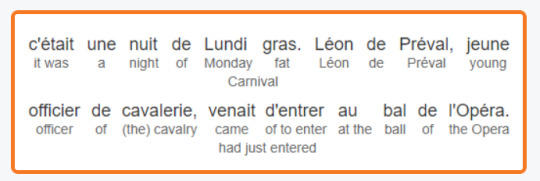
Language Crush
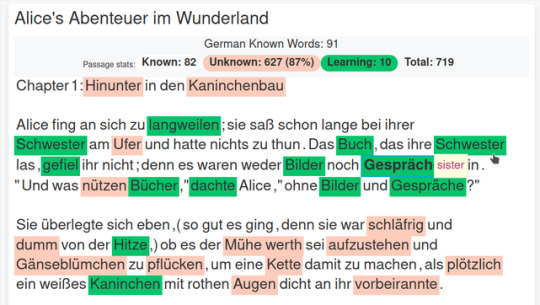
Readlang
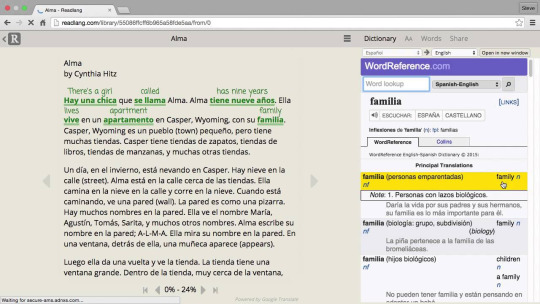
Vocab Tracker

9K notes
·
View notes
Text
My favourite (free!) language learning apps
General:
Duolingo - everyone's heard of this one (and is familiar with its slightly threatening owl mascot). This has been my favourite language learning app ever since I started using it; it allows so much practice, with none of the actual content being stuck behind a paywall, unlike a lot of popular learning apps.
Drops - this is a vocab learning app with many different languages available. The free version offers 5 minutes of learning a day, which doesn't sound like much but is great if you have a busy schedule.
For Spanish learners:
SpanishDict - Primarily a Spanish dictionary, this app also has grammar lessons, vocab lists and conjugation practice. A really great app that I make use of on a daily basis!
For Japanese learners:
Ringotan - a kanji learning app that uses spaced repition learning. You can choose what order to learn the kanji (for example in the order they are introduced in a certain textbook, or following JLPT)
Kanji Tree - similar to Ringotan, but you can choose between recognition, reading and writing practice (so if you only want to be able to read Japanese and don't care about writing, this is probably a better option)
Infinite Japanese - a great app for beginners, this teaches basic vocab such as colours and animals while feeling more like a game rather than study.
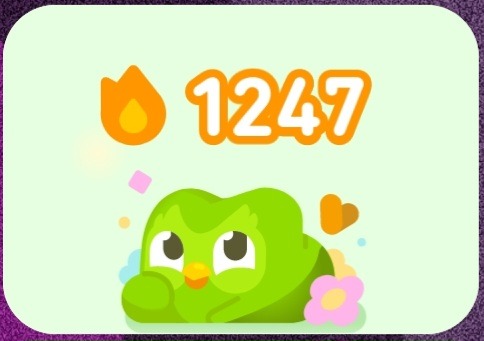
#language learning#language study#learning spanish#learning japanese#langblr#french#language#studyblr#spanish#japanese#queue need to get a life
380 notes
·
View notes